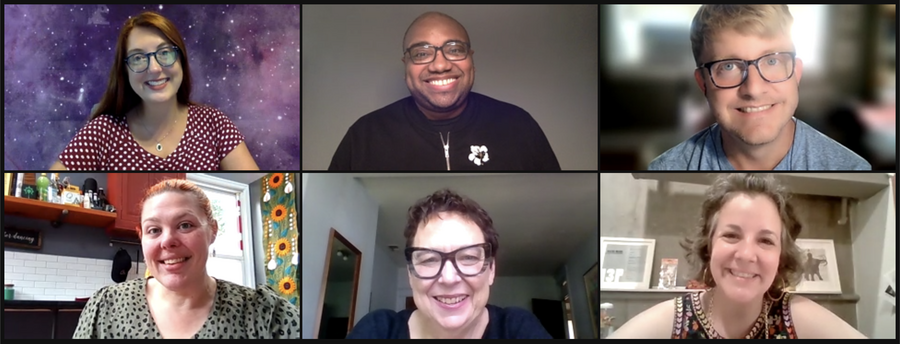As Young Playwrights’ Theater (YPT) learned when we began our own internal antiracism work in 2017, you can’t fix something that you cannot—or will not—name. American theatre is not immune to the racist, oppressive practices baked into other industries, but too often we are resistant to holding up the same mirror to our own institutions that we hold up to society through the work on our stages. We must stop leaning on radical art to justify oppressive art-making, and start talking about radical hiring, decision-making, budgeting, and power-sharing. We named racism as an emergency at YPT. It’s still an emergency in American theatre, and it’s still an emergency in America. We have to respond to the emergency of racism with the same sense of urgency and action that we would any other crisis.
Developing a practice of talking openly and often about racism—of naming what was wrong and then changing it—was transformative for YPT. We are a very different organization now than we were in 2017. To get here, we had to slow down and really examine the ways our structural hierarchies were reinforcing oppressive informal and cultural hierarchies. We had to develop antiracist policies and systems of accountability that exceeded legal anti-discrimination protections and prioritized the safety of people over the safety of our institution. And we had to rebuild a business model that prioritizes things like fully paid family leave and fair artist compensation over growing our season or expanding our programming. We believed that if we couldn’t make theatre in an anti-oppressive way, in which a diverse group of staff and artists were safe, supported, and well-compensated, then we shouldn’t be making theatre.
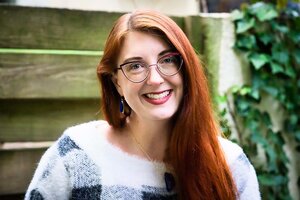
Words have power. This truth has always informed our artistic and educational philosophy at YPT. It has been core to our internal antiracism work, and it was an impetus for the antiracism consulting initiative AROW (Abolishing Racism and Oppression in the Workplace) we launched in 2020. We created AROW as a way to share our knowledge and firsthand experiences of creating a more just work environment. AROW is built on the idea that antiracism and anti-oppression work isn’t just about shifting hearts and minds, but about fundamentally upending the day-to-day policies and practices that may unintentionally reinforce oppressive systems and values.
While implementing an AROW program for theatreWashington, Amy Austin, the organization’s president and CEO, expressed a desire to share this knowledge with the entire D.C. theatre community. From there, we created the AROW Community of Practice, which brought together over 70 theatre leaders from more than 35 theatre companies around the D.C. metropolitan area to talk openly about their struggles and successes with antiracism and anti-oppression work.
Over the course of six months, these leaders discussed how racism was showing up in their organizations, the barriers to doing this work in earnest, the pressure to execute performative gestures and statements, and the risks of maintaining the status quo. They also crafted new organizational values through an anti-oppressive lens, revised existing organizational language to reflect their shift in values, and, perhaps most importantly, developed a practice of talking openly with each other and their respective staffs about racism and oppression in the American theatre. This work is only sustainable when we do it as a community.
We recently brought together several theatre leaders who participated in AROW Community of Practice, including Amy Austin (she/her), president and CEO of theatreWashington; Mark Chalfant (he/him), artistic executive director of Washington Improv Theater; Maria Manuela Goyanes (she/her), artistic director of Woolly Mammoth; and Katherine Offutt (she/her), executive director of Flying V Theatre, to talk about their experience in Community of Practice, why discussing racism matters, how theatre institutions can be less oppressive, and their hopes for the future of American theatre.

JARED SHAMBERGER: I want to start off really big. Why does acknowledging that racism exists in theatre institutions seem so taboo in American theatre?
KATHERINE OFFUTT: I think part of it is because a lot of arts creation is built so inherently on trusting one another. So if we acknowledge that there’s this deep, insidious thing that is built underneath all of that trust in creation, then we don’t actually have a foundation for creating really open and honest art. So then doesn’t the whole thing break down?
MARIA MANUELA GOYANES: We have a lot of big talk in the theatre. Actually walking the walk is different. And when you are getting accolades from critical organizations, from grant-making organizations, from various places that say you’re doing great, then it’s hard to want to change, because you think all that stuff might go away.
OFFUTT: There’s also this whole notion of nonprofit culture that’s built-in there: that of course we are helping people and of course we are the good people, right? We’re not the “corporate shills.” So if we acknowledge that even as the “good guys,” we are creating this irreparable harm to individuals and the like, there’s a dissonance there that people don’t want to acknowledge.
MARK CHALFANT: I think until recently there wasn’t a widespread culture of it being okay to talk about where your organization is coming up short or where you haven’t been doing good work, like there was this pressure to always tell the good stuff, and anything that’s not going right, to sweep it under the rug or deal with it in-house. I think transparency has really sort of elevated everywhere in our culture. Everybody knows that there are problems everywhere. So if you’re not talking about your problems, that’s almost worse now, because that means you’re in deep, deep denial because we know you’ve got them.
OFFUTT: If we felt that we could be open with the people who effectively make or break our organizations financially, we might feel safer to start talking more about the stuff that is making and breaking us personally.
BRIGITTE WINTER: That’s a really good bridge into the next question, which is about transparency and creating a practice of discussing racism and oppression and how those things show up in theatre spaces. Community of Practice brought all of you together to discuss openly what’s happening in your organizations, in cohorts with other theatre leaders in our community. What is the value of doing this work collectively in that format?
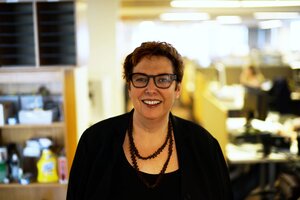
AMY AUSTIN: There’s an opportunity to see how it affects different-sized organizations and how they’re addressing this problem. There’s an acknowledgment that this is across the board. Racism and oppression are everywhere and something that everyone needs to address. Working collectively also means acknowledging that there is a problem and then holding ourselves and our community accountable.
CHALFANT: It was helpful just to hear and learn from one another, right? Like, oh, wow, they are several steps ahead in this part of this work, and these are some of the challenges they faced with their board or with their staff. There was just a lot of anecdotal learning. I think it’s so easy for this work to slide onto the back burner, so that monthly convening created urgency around the work that Community of Practice gave us.
OFFUTT: It was also helpful to think about how, while there are things that we are changing as individual organizations, there are things that we are trying to change as a community. We share performers and technicians and designers and playwrights, and all those people move between organizations. We are trying to create a complete arts ecology that values these things.
SHAMBERGER: So we’ve talked sort of broadly about the value of doing this work collectively. I’m curious, what was your personal experience in having these conversations about racism and oppression in theatre openly with other leaders?
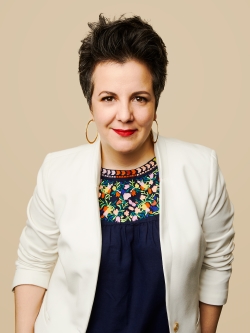
GOYANES: I really appreciated the facilitating that Brigitte did in my small group around this, because there can be a sense that we’re all on the same page, that we’re all on the same team, speaking the same language, and preaching to the choir. And I’m always really taken aback by how much we’re not actually all speaking the same language, and the choir is pretty divided. It actually was very helpful for me to be continually reminded of that, because I think that my default in the theatre is to make assumptions that we’re all working toward the same goal, and that’s just not true.
AUSTIN: There was a lot of vulnerability in those small groups and we had some breakthroughs in really trying to get the amount of trust that is needed to have these conversations. We are trying to connect the community together to identify similar values and similar goals.
OFFUTT: I think historically there’s been this pattern where the smaller organizations want to wait and see what the big theatres do. It’s like a risk assessment, right? Small organizations don’t feel like we have the resources to take risks. And we want to see the stalwart, enduring big organizations do it first. It was really helpful to be having these conversations at the same time with people from other-sized organizations. It was empowering as a smaller organization to be like, no, we can do and should be doing this work at the same time, and it’s still just as valuable, and the risk is the same to us.
CHALFANT: And there’s something I think that’s counterintuitive about what you just said. Washington Improv Theater is also on the smaller end of the scale. But I think one thing that sometimes the Community of Practice showed me is that one of the advantages to being smaller is that sometimes we could make decisions faster, and just try things faster.
SHAMBERGER: Some of the homework from Community of Practice included doing an internal assessment of your organization’s needs, developing organizational values, creating resources for artists, and revising and generating new external language about your antiracism work. Based on your experience in Community of Practice, what sorts of concrete changes and shifts have you either considered or begun implementing within your organizations?
GOYANES: For us, it became really clear we actually needed some help on a larger scale. So actually, even though I felt like we showed up having already done a lot of the language work, the stuff that has always been difficult for Woolly is operationalizing all of it, and actually having it be integrated into our culture. And so we, in full transparency, actually asked AROW to come and help us do that. So that essentially was our next step.
CHALFANT: Yeah, we’re in the exact same boat. I think the practice of clarifying and articulating our values was really powerful for us. It just clarified a lot of things that were already there. Then it was like, wow, how have we been a theatre company for 23 years and we’ve never had a conversation about these things? But exactly what Maria just said, getting to operationalizing it and actually doing all of the steps to change these practices and change these processes, and involving completely new groups of stakeholders—that is deep-tissue work that we’re only embarking on now. And we also really needed to have an individual consultancy with AROW to help us through the nitty-gritty of that.
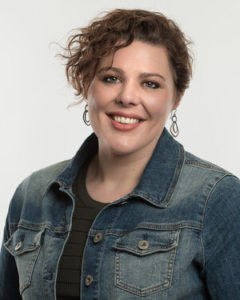
OFFUTT: Flying V embarked on a shared leadership model this year. And it was really interesting to do this work simultaneously, because I think there were a lot of things that we as individuals on a leadership team didn’t realize we felt were inherent and assumed. So the process of literally writing out everything that we value—Brigitte and Jared can talk about how intense our values conversations were—was also an exercise in establishing some of the ways our new leadership team communicates. Now, collectively, we have this document that says this is what we all agree on centering in our work as leaders. And it helped us trust one another to do different parts of our own work better.
SHAMBERGER: I’m curious: If you could give one piece of advice to another leader beginning this work, what would that advice be?
AUSTIN: When you meet resistance, keep pushing through it and work with those that give it to you because they’re on a journey, we’re all on a journey, and you can find a way to continue that journey. Do not let the resistance stop you. And make the next move as urgent as you can.
GOYANES: Be curious about your own resistance, and when you notice that internally something is happening, that you are resisting, ask some questions of yourself in that moment with curiosity to be able to move through that moment.
AUSTIN: Thank you, Maria. That was a great addition.
GOYANES: The one-two punch, Amy. We did it together.
WINTER: We’re going to close with a big question because we opened with a big question. Here it is: What are your hopes for the future of American theatre?

CHALFANT: I think that theatre can be a platform and a place for conversation for everybody. That it can really be a place of genuine dialogue and a place where you can enter a room and be in community with an audience and with artists in a way that is charged and feels real and powerful. Theatre can include everybody if we are conscious of that as a goal.
GOYANES: You know, the first thing that comes to my mind is that I bought a new copy of Octavia Butler’s Parable of the Sower and Parable of the Talents this weekend at Busboys and Poets. There is something to the idea of change and allowing change to be part of our lives. And I think that is always at odds for me with institution building, which feels often so concrete and staid and the same. It’s the same efficiency, doing it the same over and over again. I think that the theatre can actually have a lot more room in it and be a lot more adaptable, nimble. There is a quote somewhere that says, “The most dangerous thing to say in an organization is something like, ‘We’ve always done it this way.'” And my hope for the future of the American theatre is that that doesn’t get said.
OFFUTT: I’d like to have theatre get to a place where when you get a group of theatre professionals together, the first thing we do isn’t tell war stories. I feel like that is a big part of theatre culture, where artists get together and we all talk about what terrible production story we’ve got. That director who made us feel small and insignificant, sometimes intentionally. Or that time an actor had to go on with a prop made of toothpaste and string and hope. Or insane tech week hours where we’re all sleeping in the house, etc. We’re basically just sharing trauma behind humor. And that’s become part of the institution of creating theatre, that you kind of have a “the ends justify the means” mentality. We go: “But the show turned out great.” I really want to see theatre, as an institution, get to a place where the process of making it is as important universally to the art that ends up on the stage. That no one has to just “suck it up” and that we agree that the experiences artists walk away with, not just what the audiences walk away with, is critical to what a successful production is.
Jared Shamberger (he/him) is the education director and Brigitte Winter (she/her) is the executive director of Young Playwrights’ Theater (YPT), an arts education organization and producing theatre in Washington, D.C. Together they lead AROW (Abolishing Racism and Oppression in the Workplace), a program for organizations seeking to dismantle oppressive work culture and practices.

